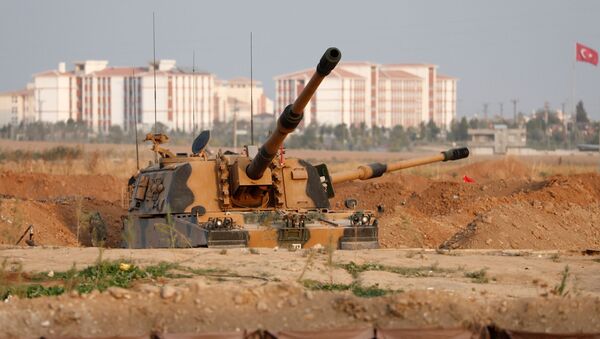“We will take a pause for five days. This is not an armistice, not a ceasefire, this is a pause. A ceasefire is given between two warring countries. Here in Syria, we give the Kurdish People's Defence units the opportunity to leave the 32-kilometre deep “safe zone”. After they leave we shall discuss a permanent ceasefire. However, we will continue to fight against the ISIS*,” Turkish Foreign Minister Mevlut Cavusoglu said.
Turkish political scientist and specialist on the Middle East at the Centre for Middle Eastern Strategic Studies (ORSAM), Oytun Orhan, in an interview with Sputnik, commented on the agreement reached between Turkey and the United States and spoke about scenarios of future development in the region.
According to Orhan, first of all, it is “Turkey, Russia, and Syria who have benefited from this agreement while the United States and Kurdish People's Defence (YPG) units were on the losing side.”
“Speaking of the US “loss”, it should be borne in mind that Trump, in principle, did not want victory but the withdrawal of troops from Syria. Therefore, in this situation, in Trump’s perspective this is a victory, and in terms of US influence in Syria, a loss. The US-Turkey reached an agreement during US Vice President Mike Pens’ visit to Ankara is basically an iteration of the agreement the two countries reached several months ago. However, the US’s further position on this issue – Washington’s attempts to delay the process of creating a safe zone – forced Turkey to take a decisive step and launch an offensive Operation Peace Spring,” Orhan said.
Under the current agreement, Washington promised Ankara the implementation of those points on the security zone that had previously been constantly postponed. In accordance with this decision, the Kurdish YPG units are to withdraw from the 32 km long territory, lay down all their heavy weapons, after which these areas will come under the Turkish Armed Forces control.
“Looking at this picture, it becomes clear that in this case Turkey, without resorting to military methods and not falling under the influence of American sanctions, will achieve its objectives. Thus, from Turkey’s standpoint, this agreement is a great success,” the expert noted.
Nevertheless, Oytun Orhan pointed out several difficulties and uncertainties present in the clauses of the US-Turkey agreement.
“The main question is how viable this agreement is. Can the US convince Kurdish YPG units to leave the area? Will the US military, who have almost completely withdrawn from Syria, be able to take heavy weapons from the YPG? What will be the position of Russia?”
Furthermore, according to the expert, there is a serious question of whether this agreement will cover the entire border region – Turkey’s planned “safe zone” or only the territory between Ras al-Ayn and Tell Abiad, where the operation is being conducted.
“So far, there is uncertainty on these issues. If the ceasefire or a pause in the operation covers only the area between Tell Abiad and Ras al-Ayn, this will be an unsatisfactory outcome for Turkey. If the ceasefire spreads to the entire borderline, it will be a great success for Ankara,” Orhan emphasised.
Answering the question of whether additional opportunities were opened for establishing a dialogue between Ankara and Damascus under the conditions of a changing alignment of forces in Syria, the political scientist stressed that the US withdrawal from Syria would make Russia the major determining force in the region.
“Russia, as you know, intends to help build dialogue and coordination between Ankara and Damascus. Indirectly, this process has already been launched through the Astana process. At present, such cooperation between the politicians of the two countries at the highest level is not possible,” Orhan said.
However, since Turkey regularly refers to the provisions of the Adana Agreement – which, in essence, provides for security cooperation between Damascus and Ankara in combating terrorism – thanks to the mediation Russia, the two countries can now discuss coordination between the defence agencies and subdivisions, the expert concluded.
*Aka Daesh, a terrorist group outlawed in Russia and many other countries.
The views and opinions expressed by the speaker do not necessarily reflect those of Sputnik.




